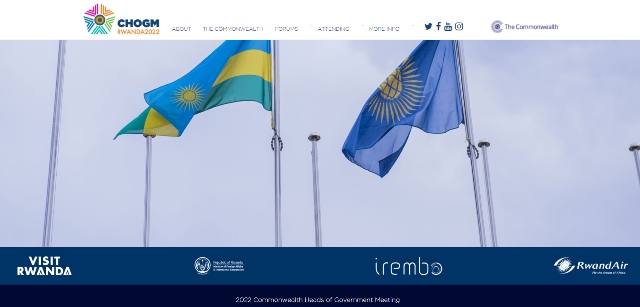 The official website for the Commonwealth Heads of Government Meeting 2022.
The official website for the Commonwealth Heads of Government Meeting 2022.
[This article is from the current edition of The Round Table: The Commonwealth Journal of International Affairs. Opinions expressed do not reflect the position of the Round Table Editorial Board]
Ukraine is not a member of the Commonwealth. Yet, more than any of the 54 current members, its shadow is set to loom large over the forthcoming Commonwealth Heads of Government Meeting (CHOGM) in the Rwandan capital in June 2022.
The decision by nine Commonwealth countries to abstain from condemning Russia for its brutal invasion of Ukraine in votes called by the United Nations looks certain to provide headaches for CHOGM, and Prince Charles as the Queen’s representative.
Long billed to be ‘the African summit’ linked to over-arching challenges of climate change, sustainability, and vaccine inequality, the meeting is now set to be turned into a test over peace, security, sovereignty, and even unity of purpose.
The Commonwealth that emerged from the 1949 London Declaration was a voluntary and consensual association, guided by flexibility. This pragmatism, a rather typical feature of British politics, allowed the Commonwealth both to ‘progress’ and to retain unity, despite sometimes overt differences.
Yet the Commonwealth also boasts a value-based approach, around broad principles of democracy, inclusion, and human rights, internally reassuring and externally appealing. Serious value divisions can therefore be testing, and raise existential questions.
This was the case when its ‘senior’ member, the British government under Margaret Thatcher, held out, alone, in refusing to condemn the Apartheid regime. The magnanimity of Nelson Mandela and skilful leadership of Sonny Ramphal allowed the association to ‘progress’ via a decent side-step.
The nine abstainers on Ukraine are Bangladesh, Mozambique, Namibia, Pakistan, South Africa, Sri Lanka, Tanzania, Uganda, and, most notably, erstwhile democracy champion and potential Commonwealth heavyweight India. A further two members, Cameroon and eSwatini, opted not to vote. The Caricom countries voted against Russia, though reports suggest divisions, some arguing it was merely ‘a white man’s war’.
Each ‘of these abstainers had its own political and domestic reasons for doing so. Most African countries remain close to Russia. Some, like Mozambique, Namibia, and the influential South Africa, remember their comrades-in-arms during their liberation struggles. Russia offered aid, arms, training, and scholarships – while the West dithered.
Russian contractors are stationed in numbers in Mozambique. Tanzania regards itself as a socialist government. Uganda will soon occupy the presidency of the Non-Aligned Movement (NAM). Cameroon is a keen purchaser of Russian arms. eSwatini is already angered by Western criticisms of human rights violations.
Russian loyalty, convenient claims of neutrality, and deepening trade ties to China, which also abstained and has a ‘limitless’ friendship treaty with Russia, also explain South Asian abstentions. Some 40 Commonwealth members are engaged with China’s Belt and Road Initiative, which is about influence as much as it is about trade and development.
Bangladesh’s ruling Awami league has been rebuffed in attempts to befriend the US, Sri Lanka is increasingly in hock to China, while Pakistan says it abstained because it ‘wants UN sanctions applied equally to all’.
The then Prime Minister Imran Khan was visiting Russia around the time of the invasion to buy wheat and gas. He, reportedly, responded angrily to calls Western for him to back the sanctions vote: ‘What do you think of us? Are we your slaves to do whatever you say?’.
Yet it is India’s stance that is causing global consternation. Under its Nehruvian principles, it set out to avoid siding with the great powers, and to nestle within the NAM that its first Prime Minister did so much to launch.
The NAM has little influence these days. But in truth the New Delhi South Block strategists have longed moved away from any such ethical foreign policy ideals – the defeat in the 1962 Sino-Indian War did for that – and the current BJP government is open about adopting an ‘India First’ strategy, and sticking with its ‘trusted and loyal’ ally.
Russian friendship dates from the 1930s, when Nehru became enamoured of the Bolsheviks’ electrification programme, and it was cemented by his daughter Indira Gandhi through the 1971 Indo-USSR Friendship Treaty. India buys some 50% of its arms from Russia, cheaper than those offered by the US, and it must retain links for repairs and parts.
The fence-sitting is historically understandable, and clearly self-interested (in line with traditional realist international relations theory). But Putin’s illegal invasion and reckless targeting of civilians, which has led to headlines of war crimes and genocide (painful echoes for a meeting in Kigali), piles moral pressure on India, not forgetting South Africa, another democratic heavyweight.
What price India’s credibility as the largest and still largely effective democracy? What of its desire of a seat on the UN Security Council? What of its leadership of the subcontinent? And what of its standing within the Commonwealth?
Commonwealth suppleness has enabled it to survive such crises, allowing it to duck and dive; and a smart communiqué demanding peace and diplomacy may paper over the cracks in Kigali.
But Putin has changed our world forever. The Commonwealth may now find its voice even more muted, while India will surely find fence-sitting rather sore indeed.
Paul Flather is a member of the Round Table Editorial Board.



